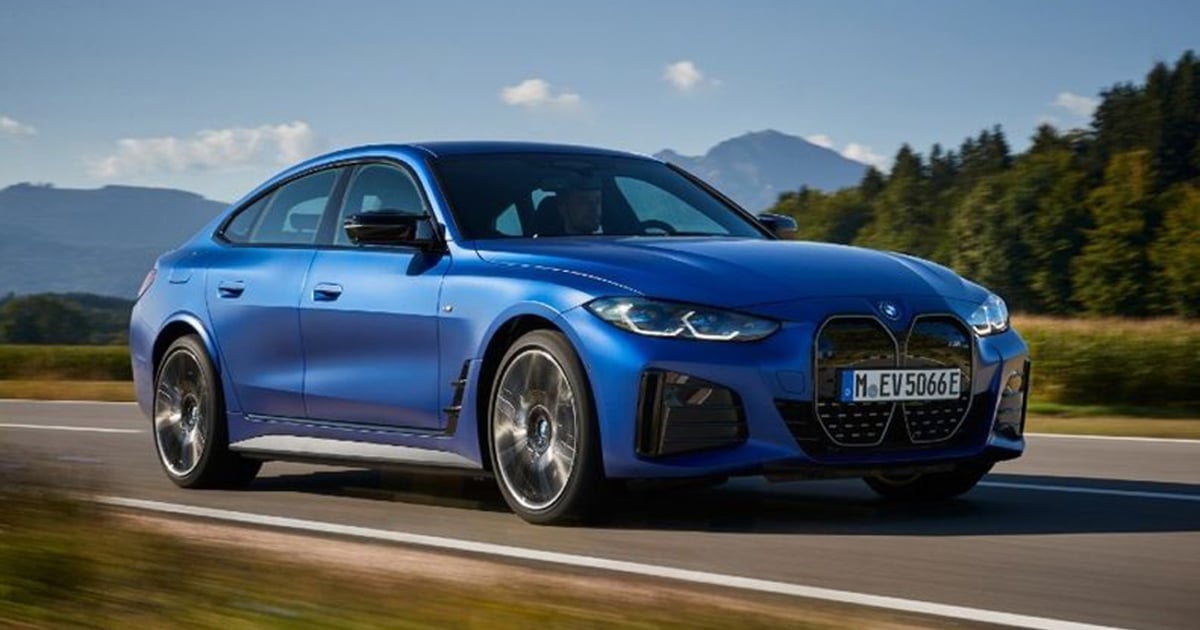
BMW anticipates selling 50,000 electric vehicles in the U.S. this year, the brand’s top sales executive told Automotive News.
That’s nearly triple the 17,964 EVs the German automaker sold in the year’s first six months.
“We’re driving electric more in the transition from a combustion-only to a world that includes combustion and BEV,” said Shaun Bugbee, BMW of North America’s executive vice president of operations. “The No. 1 volume car for us within BEV is i4.”
The electric compact sedan accounted for nearly 60 percent of BMW’s first-half EV volume, or 10,724 units.
“We have an accelerated Q3 and Q4,” Bugbee said, noting the arrival of BMW’s fourth battery model — the i5 sedan — in late 2023.
But BMW isn’t alone among luxury brands in getting a sales lift from EVs. Several competitors also hope to mount a fight with segment leader Tesla Inc. with an expanding portfolio of competitively specced and sleek battery models.
Mercedes-Benz expects EVs to account for 40 percent of its new-car sales in the U.S. by 2026 and 70 percent by 2030. They accounted for just 15 percent of the brand’s U.S. sales in the second quarter.
“We are in the middle of a transformation,” Mercedes-Benz USA CEO Dimitris Psillakis told Automotive News in May.
The expanding EV supply is also increasing consideration from Americans, despite some skepticism about the technology’s practicality and inadequate public charging.
A recent Cox Automotive survey showed 51 percent of consumers now considering electric vehicles, up from 38 percent two years ago.
Cox forecasts that 1 million new EVs will be sold in the U.S. in 2023 as automakers bring 33 new EVs to market this year.
Thanks to growing customer interest, premium-brand sales tallied 676,906 cars and light trucks in the second quarter, up 21 percent and outpacing the broader industry’s 17 percent increase.
Texas-based Tesla, which last year ended BMW’s three-year reign at the top of the luxury segment, outsold its nearest rival by more than 2 to 1 in the first half of this year.
While Tesla does not break out sales by market, the Automotive News Research & Data Center estimates Tesla delivered 173,000 cars and crossovers in the second quarter, rocketing 46 percent higher from a year earlier.
In the first half of the year, Tesla accounted for 26.5 percent of total U.S. luxury sales, up from 21.6 percent in the first half of 2022, according to Automotive News estimates. Tesla is tracking to hit another record year. It sold nearly 70 percent of last year’s total volume in the first six months of 2023.
While Tesla laps BMW, the Munich-based automaker is widening its lead over its Stuttgart-based luxury rival. BMW outsold Mercedes by 10,661 units in the second quarter.
BMW reported 87,948 sales last quarter, up 12 percent. Through the year’s first half, BMW brand sales also rose 12 percent to 170,414 vehicles.
Bugbee said that while the supply shortages of the pandemic era are fading, rising interest rates could tap the brakes on the industry’s momentum. “The interest rate environment has accelerated quite tremendously since the beginning of the year,” he said.
Even so, customer demand “continues to be resilient,” Bugbee said.
The Q3 sales pipeline is “on a stable level with Q2,” he said. “We want to maintain a stock position in the 20 to 25 days supply, and we are right on target for that.”
Mercedes delivered 77,287 passenger vehicles — down 2.3 percent — in the April-to-June period. It was one of only three major luxury brands, along with Lincoln and Porsche, to report a quarterly sales decline.
In Q2, Mercedes suffered double-digit percentage declines across nearly its entire combustion engine portfolio.
The brand’s biggest seller, the GLC crossover, tumbled more than a quarter from a year ago. The compact crossover was redesigned this spring.
Ivan Drury, director of insights at Edmunds, said Mercedes’ reliance on the GLC is “apparent,” noting that the crossover accounted for 1 in every 4 Mercedes vehicles sold in the second quarter last year.
“We’re seeing the lull between the sell down of the previous generation and the ramp-up to full production of the new model,” Drury said.
Mercedes is also ramping up production of its premium EQ lineup of battery models, which some say could eat into sales of its combustion engine vehicles.
“They have underproduced combustion and overproduced EQs,” said a retailer who asked to not be identified. “What is needed is combustion cars, not EVs.”
The source said Mercedes is in for a “rude awakening” with its rush to EVs. “The market has a voice in this, and Mercedes didn’t consider that,” he said.
But U.S. chief Psillakis told the brand’s retailers in May that fresh product and improved supply should lift U.S. sales 5 to 10 percent this year. The German luxury marque delivered 286,764 vehicles in 2022.
In addition to EVs, Mercedes is focusing on high-end and high-margin models, including the AMG and Maybach. Sales of Mercedes-AMG high-performance models spiked 66 percent in the quarter to 11,835 units.
Among other luxury brands, Lexus delivered 81,160 vehicles, up 22 percent from a year earlier, despite having a 27-day supply of inventory as of June 20.
Audi reported sales of 55,582 units in the quarter, 16 percent higher than a year earlier. Volvo’s second-quarter sales climbed 20 percent to 33,267.
Genesis sales surged 25 percent to 17,465, and Porsche reported quarterly U.S. sales of 18,895 vehicles, a 3 percent decline from a year earlier.